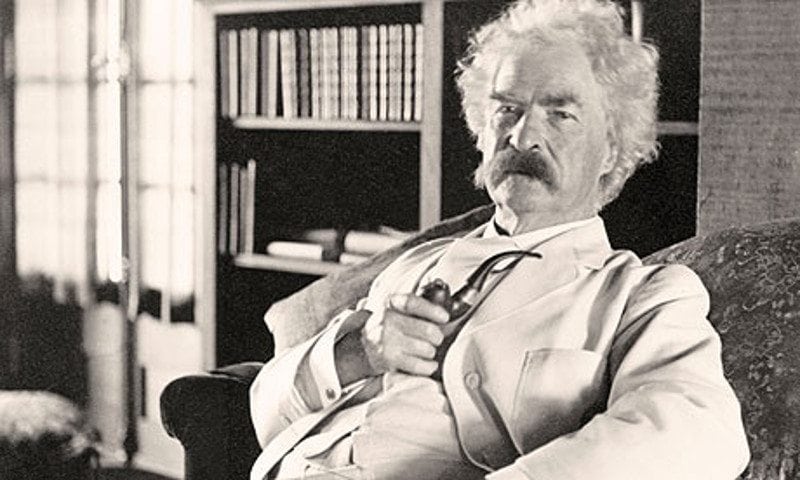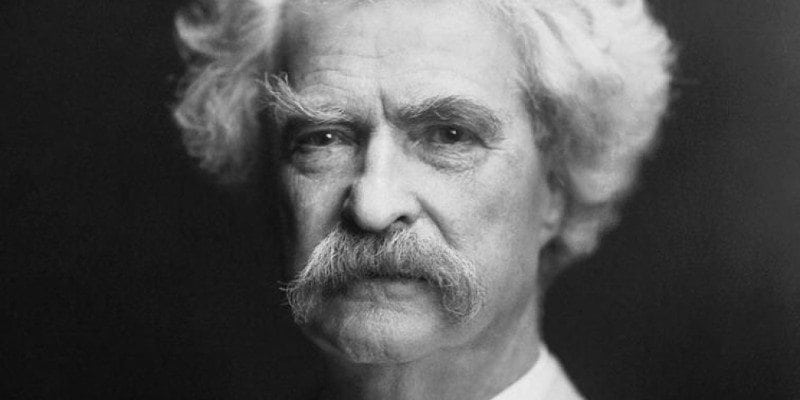Estimated reading time is 2 minutes.
“WHEN MARK TWAIN OPENED HIS MOUTH, strange things came tumbling out. Things like hoaxes, jokes, yarns, obscenities, and non sequiturs. He had a drawl—his ‘slow talk,’ his mother called it—that made his sentences long and sinuous. One reporter described it as a ‘little buzz-saw slowly grinding inside a corpse.’ Others thought that he sounded drunk.
He loved to talk: to friends, to reporters, to the crowds of adoring fans who filled lecture halls to hear him. He gave famous after-dinner toasts and tossed off witty one-liners that made great copy for the next day’s papers.
He could talk all night, preferably with a plentiful supply of cigars and Scotch on hand. He was always bursting with opinions on topics large and small and humming with ideas for new books and new business ventures. He often had trouble sleeping, and drank to numb his nerves. But he never had trouble talking.
He kept talking until the end. In the last years of his life, when he began writing his autobiography, Twain decided to do it mostly by dictation. He sat in bed, with his head propped up on pillows, and riffed and reminisced for hours at a time, while his stenographer took down everything in shorthand. When he was done, he had more than five thousand pages of typescript.
The result is the Autobiography of Mark Twain, a monster that has haunted Twain scholars for a hundred years. Its forbidding size and freewheeling structure have puzzled and infuriated generations of researchers who have descended into the archives, hoping to find a finished memoir and instead discovering ten file feet of musings, interspersed with letters and newspaper clippings. ”
[hr]
The above is from an article titled “Mark Twain’s Eternal Chatter” by Ben Tarnoff forThe New Yorker (November 13, 2013). The following is from various bits and pieces of that eternal chatter by Mark Twain
“I don’t give a damn for a man that can only spell a word one way.”
“A classic is book which people praise and don’t read.”
“Ideally a book would have no order to it, and the reader would have to discover his own.”
“The difference between the right word and the almost right word is the difference between lightning and a lightning bug.”
“Substitute ‘damn’ every time you’re inclined to write ‘very’; your editor will delete it and the writing will be just as it should be.”
“A person who won’t read has no advantage over one who can’t read.”
“Education consists mainly of what we have unlearned.”
“Books are for people who wish they were somewhere else.”
Mystically liberal Virgo enjoys long walks alone in the city at night in the rain with an umbrella and a flask of 10-year-old Laphroaig who strives to live by the maxim, “It ain’t what you know that gets you into trouble; it’s what you know that just ain’t so.
I’ve been a puppet, a pauper, a pirate, a poet, a pawn, and a college dropout (twice!). Occupationally, I have been a bartender, jewelry engraver, bouncer, landscape artist, and FEMA crew chief following the Great Flood of ’72 (and that was a job that I should never, ever have left).
I am also the final author of the original O’Sullivan Woodside price guides for record collectors and the original author of the Goldmine price guides for record collectors. As such, I was often referred to as the Price Guide Guru, and—as everyone should know—it behooves one to heed the words of a guru. (Unless, of course, you’re the Beatles.)





